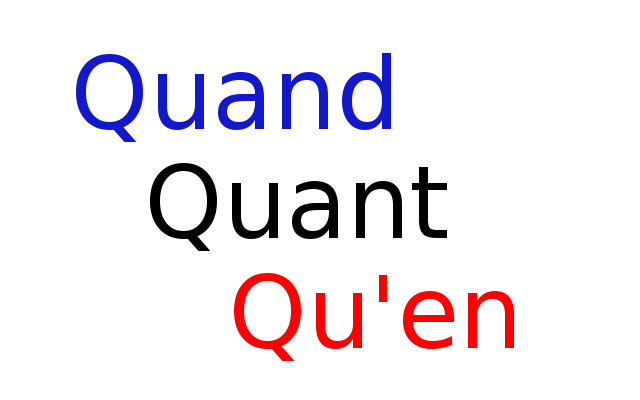
Image by John Bauer.
Un phénomène intéressant (an interesting phenomenon) when learning your native language is mixing up words that sound the same. Learning the rules can be tough and time consuming, and mistakes happen as often as misplacing une virgule (a comma). There are many homonymes that native French speakers often mix up or have trouble remembering when to use.
Aujourd’hui on va regarder ces trois mots (Today we’re going to look at these three words):
Quand Quant Qu’en
All pronounced /kɑ̃/ or “kah” with a nasal “a”.
Compare them to three words that are often mixed up by English speakers:
There Their They’re
En français et en anglais, all three are pronounced de la même manière (the same way), and are often used incorrectly as a result.
Quand when
Quand vient du mot latin (comes from the Latin word) quando and simply means when or at what time. In the English homonym comparison it’s most similar to there parce que (because) it can stand as its own word.
Quand arrivera-t-elle ?
When will she arrive?
Quant concerning _____, as far as ____ is concerned
Quant vient du mot latin quantum meaning an amount or quantity. Quant is always followed by la préposition “à”. It’s most similar to their in English, parce que it’s incomplete by itself. Their always has to be attached to a noun (their house, their ball) and quant will always have an à attached to it.
Quant à Jean, il va arriver plus tard.
As for Jean, he will arrive later.
Qu’en
Qu’en is a contraction of que and en. That makes it fairly similar to they’re parce que it’s a contraction that happens to be pronounced de la même manière.
Qu’en penses-tu ?
What do you think of it?
Quant aux homonymes, it’s important to remember ces fautes (these mistakes) can help you understand how native French speakers pronounce words and how they think of the sounds in context. Quand on voit (when you see) “Quant il pleut” it’s clear that the sound of the liaison influenced la faute. The “t” sound is natural in French in context. When spoken “Quand il pleut” sounds like “Quan til pleut”! Alors, qu’en pensez-vous ?






Comments:
Geneviève-Marie Top:
Bercy good lesson, very interesting that would be useful even to some French people (believe me, I’m French).
But, be careful, you made a mistake in your paragraph about the liaison ! You wrote “Quand on voir”, instead, you should have written “Quand on voiT” but I am sure you know that 🙂
John Bauer:
@Geneviève-Marie Top Merci ! It’s fixed now, and that gave me an idea for an interesting article! 😀
Geneviève-Marie Top:
*Very good lesson
Unique:
C’est très utile pour moi. Merci d’avoir les partager avec nous.